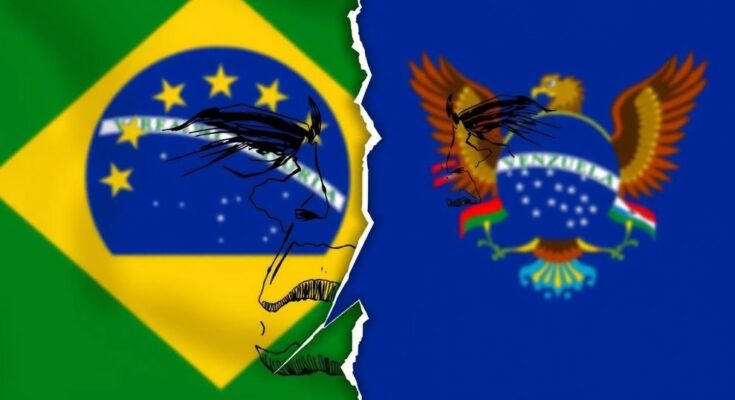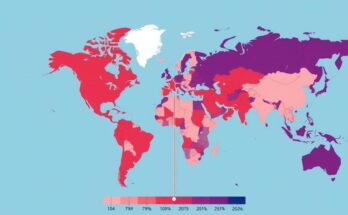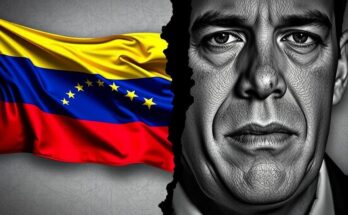Venezuela has reacted with anger over Brazil’s decision to reject its application to join the Brics group of emerging economies, labeling the move as “immoral aggression.” This tension has arisen amidst deteriorating relations following contested elections in Venezuela. Russian President Vladimir Putin emphasized the need for consensus among Brics members for Venezuela’s admission, highlighting broader geopolitical strains within the coalition.
Venezuela has expressed strong dissatisfaction regarding Brazil’s recent decision to block its entry into the Brics coalition, which comprises emerging economies. This decision was articulated during the Brics summit in Russia, where more than 20 heads of state were present. The Venezuelan foreign ministry characterized Brazil’s action as an “immoral aggression.” Tensions between the two left-leaning administrations have escalated since the controversial presidential election held in Venezuela in July. President Nicolás Maduro claimed he was re-elected, despite significant evidence suggesting that opposition candidate Edmundo González achieved a decisive victory. Initially, Brazilian President Luiz Inácio Lula da Silva supported Maduro, but later indicated that he would not endorse the election results until a detailed account of the vote was made available. Although multiple foreign entities concurred that the Venezuelan opposition secured the election, they refrained from officially recognizing González as the president. In a statement, the Venezuelan foreign ministry denounced Brazil’s persistence in upholding an earlier veto imposed by former Brazilian president Jair Bolsonaro, criticizing it for perpetuating feelings of “hatred, exclusion, and intolerance” prevalent among Western powers. President Maduro’s administration had been actively pursuing Brics membership, with Maduro even making an unexpected appearance at the Kazan summit, declaring Venezuela’s inclusion as part of the “Brics family.” Russian President Vladimir Putin voiced agreement with Venezuela’s stance but noted that membership requires consensus among existing members. He highlighted Brazil’s position while acknowledging Venezuela’s dire circumstances and mentioned that he had discussions with President Lula regarding improving bilateral relations. Furthermore, Lula was expected to attend the summit but had to cancel due to an injury sustained at home. Originating as a coalition uniting Brazil, Russia, India, China, and South Africa, Brics expanded its membership last year to include nations such as Egypt, Ethiopia, Iran, and the United Arab Emirates. Lula ardently advocates for Brics as a mechanism to reform global governance and amplify the influence of developing countries, critiquing the stagnation of international institutions. However, the Brics coalition is said to be hindered by its own internal conflicts, especially given the ongoing war in Ukraine and disputes between China and India. The Kazan summit was perceived as an opportunity for President Putin to showcase the resilience of Russia, countering its isolation due to the Ukraine invasion while simultaneously revealing the broader fractures within Brics, which left relations between Brasília and Caracas at a notably low point since Lula’s re-election.
The article discusses the recent diplomatic tensions between Venezuela and Brazil, which escalated following Brazil’s refusal to allow Venezuela’s admission to the Brics group. The context is rooted in the strained political atmosphere following Venezuela’s controversial presidential elections, where allegations of electoral misconduct have drawn international scrutiny. The Brics organization is a strategic alliance that emphasizes cooperation among emerging economies, and Venezuela’s aspiration to join reflects its desire for greater international recognition and support amid ongoing economic and political challenges. Additionally, the dynamics within Brics reveal broader geopolitical trends, especially in light of the current global power divisions and conflicts.
In summary, Venezuela’s ire directed at Brazil’s veto over its Brics membership reveals the deepening rift that has emerged following the disputed Venezuelan elections. This incident underscores the fragile relationships within the Brics coalition and highlights the struggles of leftist governments in Latin America amidst a backdrop of geopolitical tensions. The outcome of this dispute will likely influence future diplomatic engagements between the two nations as they navigate their complex political landscapes.
Original Source: www.bbc.com




